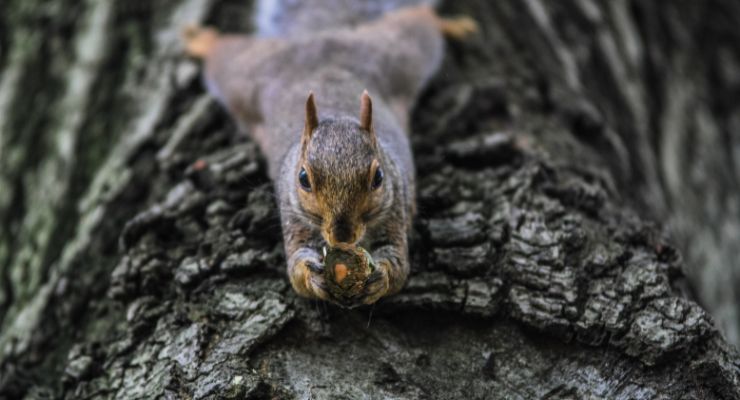A familiar sight for many, Squirrels is active and lively creatures found in forests, parks, and even the heart of cities. An omnivore by nature; their diet consists of anything from nuts, seeds, and fungi to insects or other small animals – all of which can be stored away for wintertime!
With a skillful knack for acrobatics, these furry critters continue to captivate onlookers with their playful antics.
Domestic squirrels deserve to have a balanced diet in order to remain strong and healthy, which is why we must provide them with a variety of foods. Squirrel food mixes, fruits, vegetables, and nuts are all suitable options that they will enjoy!
Of course, as animal lovers, it’s common for us to want to spoil our friends by giving them treats – but don’t forget that these snacks need to be beneficial for their health too. With the right dietary choices we can make sure our beloved squirrels stay happy and well-nourished!
Humans love chocolate, yet it can be hazardous for pets; especially dogs. In this post, we will explore if this tasty treat consumed by squirrels is safe and what risks they might face if they do ingest it.
Additionally, to protect these lovable critters, we’ll delve into their natural diet while suggesting some nutritious alternatives that can still satisfy the little creatures’ taste buds!
Can Squirrels Eat Chocolate?
Absolutely not! Although squirrels won’t experience immediate harm if they eat chocolate, it is most certainly not safe or healthy for them.
Chocolate contains theobromine which is toxic to a variety of animals, including squirrels. The toxicity can cause severe symptoms such as vomiting, diarrhea, and tremors – in some cases resulting in death. Furthermore, the amount of theobromine that may be poisonous varies depending on animal size and type of chocolate consumed.
While small dosages of delightful snacks won’t necessarily cause harm to squirrels, it is highly recommended that you refrain from doing so as a precaution.
Chocolate should never be fed to any type of pet because the consequences can be dire and potentially fatal at times. To keep squirrels safe and healthy, stay away from offering them anything containing cocoa or other sugary treats!
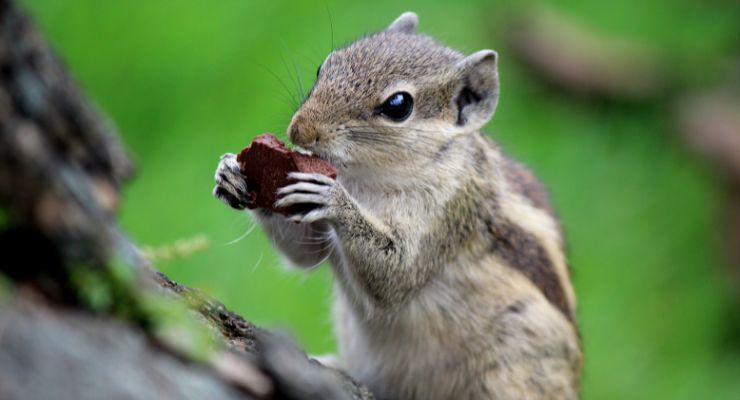
Can Squirrels Eat Dark Chocolate?
Dark chocolate and unsweetened baking chocolate contain higher amounts of theobromine than milk chocolate and are more dangerous to animals.
Can Squirrels Eat Milk Chocolate?
While milk chocolate contains fewer amounts of theobromine than dark chocolate and baking chocolate, it is still a hazardous treat for animals.
To ensure optimal health for your squirrels, refrain from offering them human foods – especially any sort of chocolates. Instead, stick to their natural diet and provide them with healthy alternatives that are suitable for their species.
Can Squirrels Die From Eating Chocolates?
Chocolate may seem like an innocuous treat, but it can be deadly to squirrels, even if you want to add chocolate covered almonds. The theobromine present in chocolate is toxic and can lead to a range of symptoms including vomiting, diarrhea, tremors, and seizures; if left unchecked this toxicity could even prove fatal.
While small doses are unlikely cause serious harm right away it’s best not to give them any human food at all – especially chocolates or any other chocolaty or non chocolaty desserts: chocolate cake, candy bar, etc!
To ensure your squirrel stays healthy stick to its natural diet which will offer optimal nutrition without putting its life at risk.
How Much Chocolate Can Kill a Squirrel?
It is difficult to determine how much chocolate can kill a squirrel, as it can vary depending on the size of the squirrel, the type of chocolate consumed, and other factors.
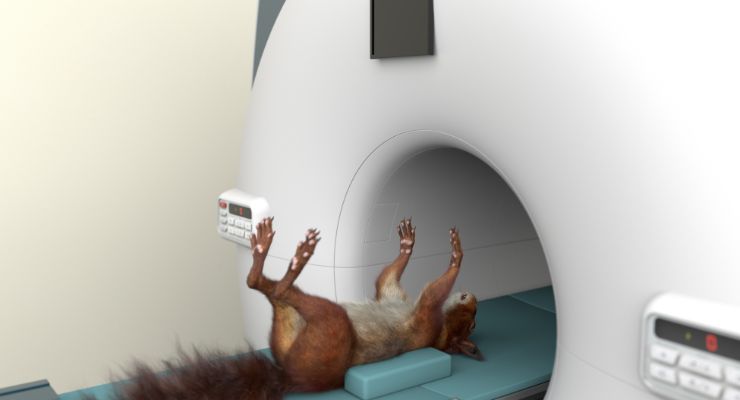
Have you heard of the phrase Lethal Dose 50 (LD50)? This term describes how much of a substance is necessary to kill half of the test subjects in an allotted time frame.
LD50 data is usually measured by quantity per unit body weight, yet can’t be used as a determinant for what amount would be toxic or safe for any particular animal. That’s because some species and individuals have very different tolerances when it comes to dangerous substances.
LD50 data is generally gathered from tests conducted on animals like mice and rats, meaning that the information may not apply to other creatures. Therefore, it would be unwise to utilize LD50 results in order to decide how much chocolate or any other substance squirrels can safely consume.
If you suspect that your squirrel has ingested chocolate or any other potentially toxic substance, it is important to contact a veterinarian or a wildlife rehabilitation specialist for advice and treatment.
How About Feeding White Chocolate to Squirrels?
If you’re considering giving treats to your furry friend such as squirrels, white chocolate is not a safe or healthy choice.
Although it contains cocoa butter, sugar, and milk solids instead of the toxic compound known as theobromine present in standard chocolate varieties, the white chocolate bar still carries high amounts of fat and sugar – both elements which can lead to obesity if consumed too frequently by animals.
Therefore, we suggest opting for alternative snacks that are better balanced nutritionally speaking!
Is It Okay to Feed Squirrels?
Feeding squirrels can be a fun and rewarding activity for many people. However, it is important to consider the potential impacts of feeding squirrels and to do so in a responsible manner. Some potential considerations include:
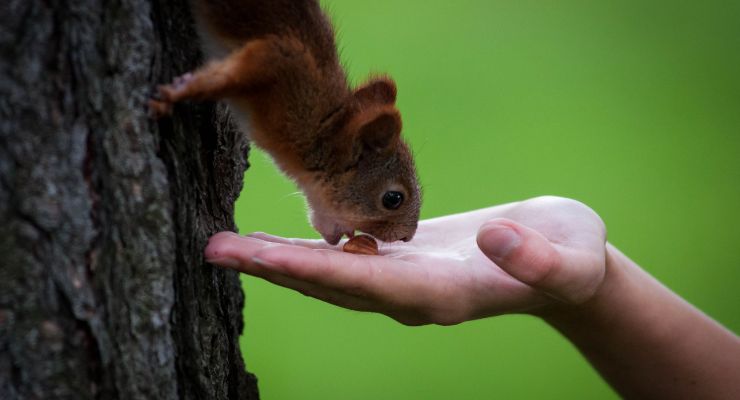
- Nutritional needs: It is important to provide a balanced diet for squirrels, including a variety of nuts, seeds, and vegetables. Avoid offering squirrels unhealthy or high-fat foods, such as junk food or processed snacks.
- Health and safety: Avoid offering squirrels any potentially toxic substances, such as chocolate or alcohol. It is also important to avoid overfeeding squirrels, as this can lead to obesity and other health problems.
- Impact on natural behaviors: Feeding squirrels can alter their natural feeding behaviors and may make them more reliant on human sources of food. This can make them more vulnerable to predators and less able to adapt to natural food shortages.
- Impact on the environment: Feeding squirrels can also impact the local ecosystem and may attract other animals, such as birds and rats. It is important to dispose of any uneaten food and clean up any litter to minimize the environmental impact.
When done responsibly and thoughtfully, it is generally acceptable to become a squirrel feeder. Nonetheless, be mindful of potential effects and always adhere to any local regulations or requirements that may exist.
What are the Unsafe Foods for Squirrels?
On top of discussing the question of whether can squirrels eat chocolate, there are several human foods that are toxic to them to eat. Here are some of them that are poisonous to squirrels:
Pet Food
Pet food is generally safe for squirrels to eat, as long as it is formulated for their nutritional needs. Some types of pet food, such as dog food, may not meet the nutritional needs of squirrels and should be avoided.
It is best to choose a commercial squirrel food mix or to provide a varied diet that includes a mix of nuts, seeds, and vegetables.
Avocado
Avocado contains a chemical called persin, which can cause gastrointestinal upset in squirrels and other animals.
Salted Snacks
It is not a good idea to feed salted snacks to squirrels or any other pets. Salted snacks, such as chips or pretzels, are high in sodium and may not provide the nutrients that squirrels need to maintain their health.
In addition, consuming too much sodium can cause health problems in squirrels and other animals, such as electrolyte imbalances and dehydration.
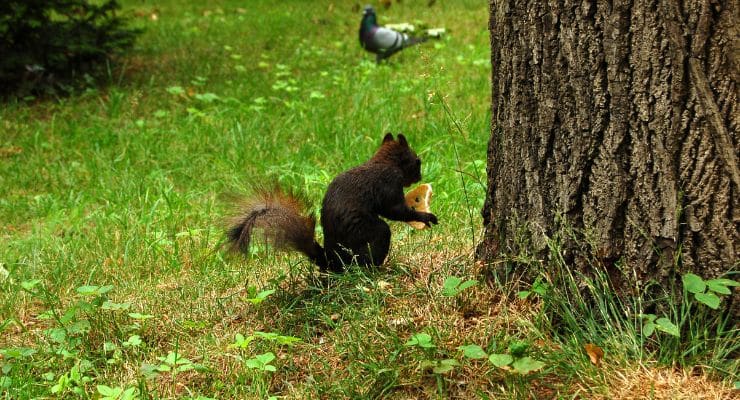
Alcohol
Alcohol is poisonous to squirrels and other animals too and can cause symptoms such as vomiting, diarrhea, difficulty breathing, and even death in severe cases. If you noticed that a squirrel or any other animal has ingested alcohol, contact immediately ASPCA Animal Poison Control Center.
Caffeine
Caffeine can be toxic to animals and can cause symptoms such as restlessness, rapid breathing, heart palpitations, and muscle tremors.
Grapes and Raisins
Grapes and raisins can cause kidney failure in squirrels and other animals.
Onions and Garlic
These vegetables can cause anemia in squirrels and other animals.
Raw Potatoes
Raw potatoes can cause gastrointestinal upset in squirrels and other animals.
Corn
Corn (fresh corn) is generally safe for squirrels to eat, but it should not be the primary source of their diet. Corn can be a good source of carbohydrates, but it is not as nutritionally rich as other foods, such as nuts and seeds.
Peanuts
Peanuts are a safe and healthy option for squirrels and can be a good source of protein and fat. However, it is important to choose unsalted raw peanuts and to offer them in moderation, as they are high in calories.
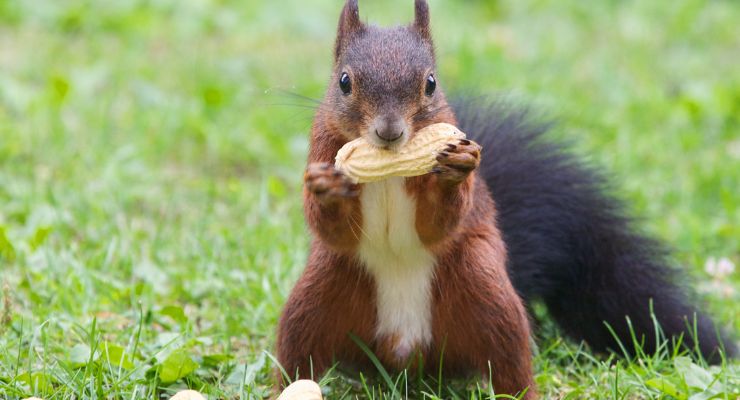
Cereal
Cereal can be a safe option for squirrels, as long as it is a whole-grain variety and does not contain any added sugars or artificial ingredients. However, it should not be the primary source of their diet and should be offered in moderation. Nuts and seeds are a more nutritionally dense option for squirrels.
What Do Squirrels Typically Eat?
In the wild, squirrels have a varied diet that consists of nuts, seeds, fungi, and occasionally insects and other small animals. Nuts and seeds make up a large portion of a squirrel’s diet and are a good source of protein, fat, and essential vitamins and minerals.
Some common types of nuts and seeds that squirrels may consume include acorns, hickory nuts, macadamia nuts, walnuts, almonds, and sunflower seeds.
Squirrels are also known to eat fungi, such as mushrooms, as well as insects and other small animals, such as eggs and baby birds.
While squirrels are generally omnivorous, their diet can vary depending on the availability of food in their environment.
Domestic and pet squirrel may be fed a variety of foods, including commercial squirrel food mixes, fruits, vegetables, and nuts. It is important to provide a balanced diet for them in order to ensure their overall health and well-being.
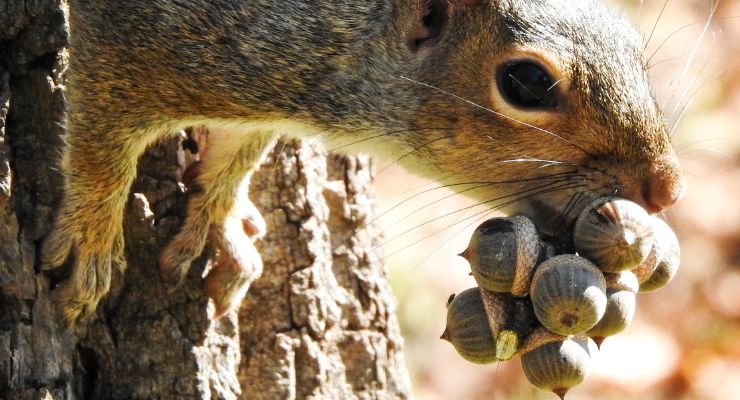
Conclusion
In conclusion, it is not safe for squirrels to eat chocolate, cocoa powder, cocoa beans, or any other related product. It can lead to chocolate poisoning. Chocolate contains theobromine, a chemical that is toxic to many animals, including squirrels.
Theobromine can cause a range of symptoms in animals, including vomiting, diarrhea, tremors, seizures, and even death in severe cases.
Chocolate is not viable or beneficial for squirrels, so it’s best to avoid feeding squirrels with this type of treat. Instead, focus on offering items from their natural diets such as nuts, seeds, and fungi along with insects and small animals.
Furthermore, if you’re looking to reward your squirrel friends in an appropriate manner then think about giving them healthier alternatives like nutty snacks instead!
It is critical that we always keep the well-being of our pets and wildlife in mind before offering them any human food.
